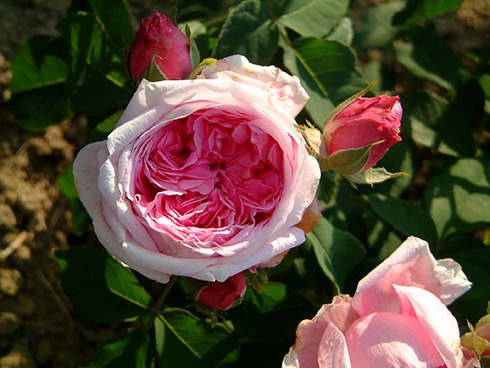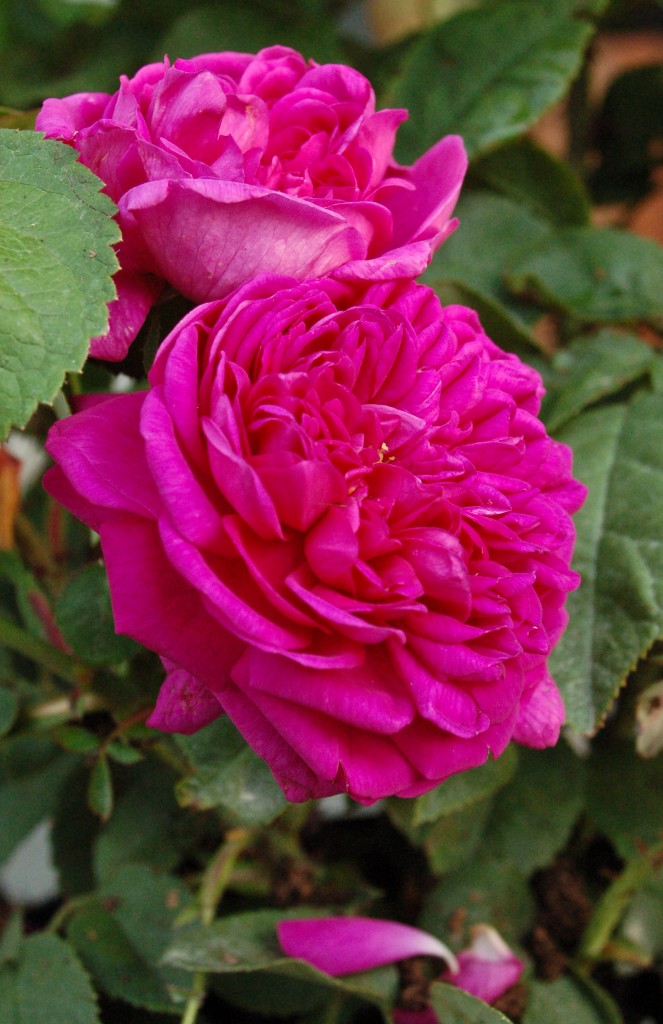Morning
The air was foggy and smoggy and rather colder than I expected for this part of the world. My mind was still slow both from jet lag and the abbreviated night of sleep. I leaned my forehead against the cold smooth glass of our crazy multi-colored hippie tourist minibus with the carved teak interior in a vain attempt to wake myself up properly, and watched the first stirring people and crumbling edifices of modern Varanasi slip by. The van stopped. We were going to have to go on foot to our destination from that point, since winding, trash-strew cobbled lanes in the most ancient part of the city couldn’t accommodate cars. We were to greet the dawn at one of the ghats that have lined the shore of the Ganges here since time immemorial.
As we trudged along, the usual ancient city smells of trash and water and cows and shit and people and breakfast and exhaust and monkeys were gradually joined by the sweet, indolic, unmistakable perfume of roses. But there were no open shops (the hour was way too early), or perfumed ladies (just some grungy-looking western male scientists), and no part of my well paved-over surrounding looked like they could support a plant of any kind.
With each step we took approaching the ghat, and each moment closer to the rising of the sun, the activity around us increased. Several street children, delighted at their luck spotting a bunch of groggy and clueless westerners, hurried to us hoping to sell deep for an especially good price: plastic bowls holding a votive candle surrounded by flowers. I chose one filled with marigolds and a simple pink wild rose. As I held this thing before me, the smell of rose perfume had much the same effect that the cup of coffee I didn’t have that morning would. And I realized that this modest spot of pink among gaudy golden marigolds was the real rose of poetry and song, and not the perfectly long stemmed, perfectly red, perfectly plastic wrapped, and perfectly sterile perfections that I knew from home. I was very pleased to make my acquaintance with this modest pink regal bloom. And by the shore of the Ganges, I lit the candle next to her, made a wish, and bid her fair journey.

Deep (Flower-lamp offerings) One traditionally buys flowers, marigolds and strongly fragrant roses, with a candle from street children to give to the river as offerings. The wish one makes as one sets the flowers in the water is meant to come true. These are ours - they did not seem to want to flow away, but hugged the shore instead.
Old Garden Roses
The scent of that little pink rose has haunted me. Back in Europe, I sniff at every rose bush I see (much to my husband’s annoyance). Most of them disappoint. Once I’d determined that our front border has the right conditions for rose bushes, I set about looking for some cultivars that could possibly offer at least a tenth of the scent of that little Indian rose.
The perfume production variety that grows in Bulgaria’s Valley of the Roses is some sort of Damask rose, so I began my search with those. Damask roses are but one family of roses that fall under the umbrella of “Old Garden Roses”. These are classes of roses that were bred before 1867, the date of the emergence of the first modern hybrid tea rose, when appearance and longevity as a cut flower became more dominant attributes for selection than scent.
There are numerous families of roses that fall under the Old Garden Rose umbrella. Many, but not all, of these families are highly scented. Some families tend to bloom only once in June, others bloom continuously through the fall (perpetuals), still others have one main flush of blooms in June followed by smaller secondary flushes through the summer.
Since I don’t have a huge amount of space for roses, I opted for repeat-flowering roses. And of course intense fragrance was a must. I am drawn particularly to the Portland roses. These roses inherit an intense perfume from their Damask parentage, and their repeat blooming habit from their China rose progenitors. As plants they also tend to stay relatively small.
I picked two. One, Mme Boll, has very full pink flowers, and a very strong scent of rose of the sort of great grandmother’s perfume. It was bred by Boll/Boyan in 1850. It’s often confused with roses Mme Knorr and Comte de Chambord which some sources say are the same, and others say are merely related. One way or another, it’s a lovely old fashioned sort.
My other selection was Rose de Rescht. This is a rose that is sometimes classified as a Damask rose, and othertimes as a Portland rose because of its repeat blooming habit. It is a very old sort that originates in Persia, and was brought to Europe relatively recently (either 1890 or 1950, depending on the source). Rescht’s fragrance is a hair stronger than Mme Boll’s, and a little more indolic and sweet. It is the sort of scent that makes me think of rose lokum or sticky rose water infused baklava sitting on a metal platter on a sweltering evening.
After picking which ones I wanted from descriptions on the internet, I happened upon Mme Boll in a local garden center. I ordered Rose de Rescht from Eggert Baumschulen, who delivered very quickly and offered a good price, and whom I’d recommend.
© 2011 – 2012, Converting a Church. All rights reserved.


